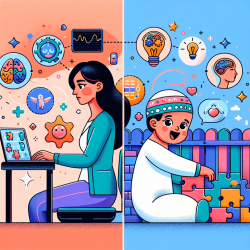As a practitioner dedicated to providing the best possible care for students with special needs, staying updated with the latest research is crucial. The recent study titled "Demographic and clinical predictors of response to internet-enabled cognitive–behavioural therapy for depression and anxiety" by Catarino et al. offers valuable insights that can help you enhance your skills and improve outcomes for your students.
This study explores various demographic and clinical factors that influence the effectiveness of internet-enabled cognitive-behavioral therapy (IECBT) for treating depression and anxiety. By understanding these predictors, you can tailor your approach to better meet the needs of your students.
Key Findings and Their Implications
- Older Age: The study found that older patients are more likely to respond positively to IECBT. This suggests that older students may benefit more from structured online therapy sessions.
- Absence of Long-Term Physical Comorbidities: Students without long-term physical health issues showed better outcomes. It’s essential to consider physical health when planning therapy.
- Lower Symptom Severity at Start: Students with milder symptoms at the beginning of therapy were more likely to improve. Early intervention is crucial.
- Shorter Waiting Times: Reducing the waiting time for initial assessment can lead to better outcomes. This highlights the importance of timely access to therapy.
- Longer Treatment Durations: More extended treatment periods with more sessions were associated with better outcomes. Consistency and persistence in therapy are key.
Implementing These Insights
Here are some actionable steps you can take based on the study’s findings:
- Prioritize Early Assessment: Ensure that students are assessed and begin therapy as soon as possible to maximize their chances of improvement.
- Tailor Therapy Duration: Plan for longer treatment durations with more sessions, especially for students with severe symptoms.
- Consider Physical Health: Be mindful of any long-term physical health issues that might affect therapy outcomes and address them accordingly.
- Focus on Older Students: Recognize that older students might respond better to IECBT and tailor your approach to meet their needs.
By integrating these insights into your practice, you can enhance the effectiveness of your therapy sessions and provide better support for your students. Continuous learning and adaptation are vital in the ever-evolving field of special education.
To read the original research paper, please follow this link: Demographic and clinical predictors of response to internet-enabled cognitive–behavioural therapy for depression and anxiety.










